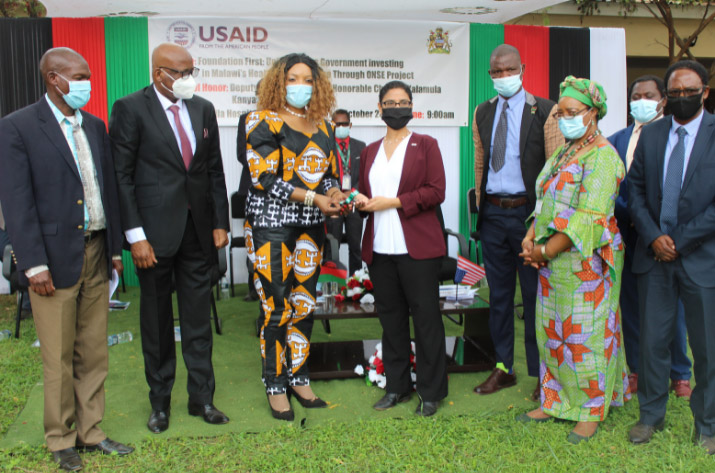Malawi’s Ministry of Health Celebrates Improvements to the Country’s Health Infrastructure
Malawi’s Ministry of Health Celebrates Improvements to the Country’s Health Infrastructure

On October 1, 2021, the Ministry of Health in Malawi and the US Agency for International Development (USAID) held a ceremony marking significant improvements to the country’s health infrastructure and the symbolic handover of new and renovated health facilities throughout the country. Malawi’s Honorable Chrissie Kalamula Kanyasho, Deputy Minister of Health, and Melissa Francis, USAID’s Acting Mission Director, celebrated the foundational improvements, which over the past five years have totaled $3.8 million (MK3.4 billion).
The event took place at Bwaila district hospital in Lilongwe, where a newly opened prefabricated family planning clinic has been established to help answer the demand for family planning services while decongesting the busy health facility, freeing up rooms for other forms of service delivery. The clinic is slated to increase essential services in one of Malawi’s fastest growing cities and heavily populated business areas, where one in five women continue to report unmet family planning needs and where the population is estimated to increase by 97% between 2020 and 2035.
“The United States Government is cognizant of the challenges faced by the Government of Malawi in meeting the health needs of the nation. ONSE, our health flagship program, has invested in creating a conducive and therapeutic environment for service delivery. For example, through renovation works at Dowa District Hospital, a pediatric ward has been transformed into an airy, bright ward with proper ventilation, treatment station, and a nurses’ office with proper furniture. A maternity ward in the same hospital—which had a very tiny labor room, torn ceiling boards, and a floor with potholes—has now become a place where women can be assured a safe and clean delivery,” said Francis.
Adequate infrastructure plays a critical role in the delivery of quality health care as it ensures appropriate space and an environment for dignified and respectful care while supporting the implementation of infection prevention measures. Work accomplished through the ONSE Health Activity will improve the quality of maternal and newborn health services, child health and nutrition, family planning, hygiene, and more.
“Appropriate infrastructure is one of the building blocks of any health system. These foundations are critical for meeting the health needs of every nation. Our current Health Sector Strategic Plan outlines infrastructure development as a priority intervention for Malawi to deliver its essential health package which focuses on reducing high morbidity and mortality in the country,” remarked Honorable Chrissie Kalamula Kanyasho.
In May 2017, an assessment of 424 public and private for-profit health facilities identified crucial service delivery gaps as well as the root causes of those gaps, including poor facility infrastructure and insufficient equipment and commodities. Since then, in partnership with the Ministry of Health and local District Health teams, ONSE has led improvements across 16 districts. Many of the infrastructure works were accomplished by teams from the Physical Asset Management (PAM) unit, a division under the Health Technical Support Services department in the Ministry of Health. This approach contributes to the government’s ownership and to the policy agenda on “Jobs for the Youth,” as some of the PAM staff were drawn from vocational schools like Malawi’s Technical, Entrepreneurial, and Vocational Education and Training Authority.
“We have approached these improvements with a strong focus on ownership and sustainability,” said Dr. Ann Phoya, ONSE’s Chief of Party. “The PAM and maintenance personnel that we have worked with have the skills to continue the work to ensure preventive maintenance, timely repair, and replacement of things that are beyond repair.”
Completed infrastructure improvements include renovated structures, improved waste disposal facilities, upgraded water systems, and plumbing and electric work across hundreds of sites throughout the country.
“We are proud of our work and remain committed, alongside our partners, to continue making life better for all Malawians,” said Phoya.